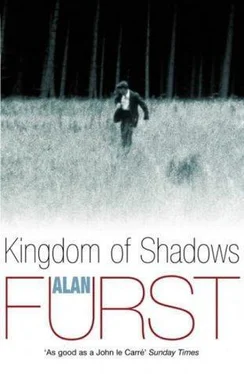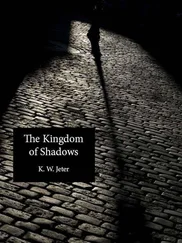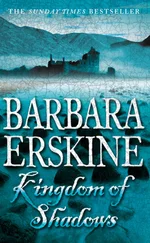Alan Furst - Kingdom of Shadows
Здесь есть возможность читать онлайн «Alan Furst - Kingdom of Shadows» весь текст электронной книги совершенно бесплатно (целиком полную версию без сокращений). В некоторых случаях можно слушать аудио, скачать через торрент в формате fb2 и присутствует краткое содержание. Жанр: Шпионский детектив, на английском языке. Описание произведения, (предисловие) а так же отзывы посетителей доступны на портале библиотеки ЛибКат.
- Название:Kingdom of Shadows
- Автор:
- Жанр:
- Год:неизвестен
- ISBN:нет данных
- Рейтинг книги:5 / 5. Голосов: 1
-
Избранное:Добавить в избранное
- Отзывы:
-
Ваша оценка:
- 100
- 1
- 2
- 3
- 4
- 5
Kingdom of Shadows: краткое содержание, описание и аннотация
Предлагаем к чтению аннотацию, описание, краткое содержание или предисловие (зависит от того, что написал сам автор книги «Kingdom of Shadows»). Если вы не нашли необходимую информацию о книге — напишите в комментариях, мы постараемся отыскать её.
Kingdom of Shadows — читать онлайн бесплатно полную книгу (весь текст) целиком
Ниже представлен текст книги, разбитый по страницам. Система сохранения места последней прочитанной страницы, позволяет с удобством читать онлайн бесплатно книгу «Kingdom of Shadows», без необходимости каждый раз заново искать на чём Вы остановились. Поставьте закладку, и сможете в любой момент перейти на страницу, на которой закончили чтение.
Интервал:
Закладка:
“The usual. Small customs post. A guard, if he’s awake. Not any traffic, to speak of. These days, most people stay where they are.”
“I imagine we can pick up a train there. For Debrecen, I guess, where we can catch the express.”
Pavlo kicked the back of the seat. At first, Morath couldn’t believe he’d done it. He almost turned around and said something, then didn’t.
“I’m sure there’s a train from Zahony,” Mierczak said.
They drove south in the last of the daylight, the afternoon fading away to a long, languid dusk. Staring out the window, Morath had a sudden sense of home, of knowing where he was. The sky was filled with torn cloud, tinted red by the sunset over the Carpathian foothills, empty fields stretched away from the little road, boundary lines marked by groves of birch and poplar. The land turned to wild meadow, where the winter grass hissed and swayed in the evening wind. It was very beautiful, very lost. These blissful, bloodsoaked valleys, he thought.
A tiny village, then another. It was dark now, cloud covered the moon, and spring mist rose from the rivers. Midway through a long, slow curve, they caught sight of the bridge over the Tisza and the Zahony border station. Pavlo shouted, “Stop.” Mierczak stamped on the brake as Pavlo hung over the top of the seat and punched the button that turned off the lights. “The bitch,” he said, his voice ragged with fury. He was breathing hard, Morath could hear him.
In the distance they could see two khaki-colored trucks, river fog drifting through the beams of their lights, and a number of silhouettes, possibly soldiers, moving about. In the car it was very quiet, the idling engine a low rumble, the smell of gasoline strong in the air.
“How can you be sure it was her?” Morath asked.
Pavlo didn’t answer.
“Maybe they are just there,” Mierczak said.
“No,” Pavlo said. For a time, they watched the trucks and the soldiers. “It’s my fault. I knew what to do, I just didn’t do it.”
Morath thought the best thing would be to drive south to Berezhovo, find a rooming house for a day or two, and take a train into Hungary. Or, maybe better, drive west into the Slovakian part of the country-away from Ruthenia, land of too many borders-and then take the train.
“You think they saw our lights?” Mierczak said. He swallowed once, then again.
“Just turn around and get out of here,” Pavlo said.
Mierczak hesitated. He hadn’t done anything wrong, but if he ran away, that changed.
“Now,” Pavlo said.
Reluctantly, Mierczak yanked the gearshift into reverse and got the car turned around. He drove a little way in the darkness, then turned the lights back on. Pavlo watched through the rear window until the border post disappeared around the curve. “They’re staying put,” he said.
“How far is it to Berezhovo?” Morath said. “Maybe the best thing now is to take the train.”
“An hour. A little more at night.”
“I’m not getting on a train,” Pavlo said. “If your papers don’t work, you’re trapped.”
Stay here, then.
“Is there another way across?” Pavlo said.
Mierczak thought it over. “There’s a footbridge, outside the village of Vezlovo. It’s used at night, sometimes.”
“By who?”
“Certain families-for avoiding the import duties. A trade in cigarettes, mostly, or vodka.”
Pavlo stared, couldn’t believe what he’d heard. “So why didn’t you take us there in the first place?”
“We didn’t ask him to do that,” Morath said. Even in the cool night air, Pavlo was sweating. Morath could smell it.
“You have to go through a forest,” Mierczak said.
Morath sighed, he wasn’t sure what he wanted to do. “At least we can take a look,” he said. Maybe the trucks just happened to be there. He was wearing a sweater, a tweed jacket, and flannels-dressed for a country hotel and a train. Now he was going to have to crawl around in the woods.
They drove for an hour, the moon rose. There were no other cars on the road. The land, field and meadow, was dark, empty. At last they came upon a village-a dozen log houses at the edge of the road, windows lit by oil lamps. A few sheds and barns. The dogs barked at them as they went past. “It’s not far from here,” Mierczak said, squinting as he tried to peer into the night. The car’s headlights gave off a dull amber glow. Just as the countryside turned to forest, Mierczak stopped the car, got out, and walked up the road. A minute later, he returned. He was grinning again. “Believe in miracles,” he said. “I found it.”
They left the car, Morath carrying a satchel, Pavlo with his briefcase, and the three of them started walking. The silence was immense, there was only the wind and the sound of their footsteps on the dirt road.
“It’s right there,” Mierczak said.
Morath stared, then saw a path in the underbrush between two towering beech trees.
“About a kilometer or so,” Mierczak said. “You’ll hear the river.”
Morath opened his wallet and began to count out hundred-koruna notes.
“That’s very generous of you,” Mierczak said.
“Would you agree to wait here?” Morath asked him. “Maybe forty minutes. Just in case.”
Mierczak nodded. “Good luck, gentlemen,” he said, clearly relieved. He hadn’t realized what he was getting himself into-the cash in his pocket proved that he’d been right to be scared. He waved as they walked into the forest, glad to see them go.
Mierczak was right, Morath thought. Almost from the moment they entered the forest they could hear the river, hidden, but not far away. Water dripped from the bare branches of the trees, the earth was soft and spongy underfoot. They walked for what seemed like a long time, then got their first view of the Tisza. About a hundred yards wide and running at spring flood, heavy and gray in the darkness, with plumes of white foam where the water surged around a rock or a snag.
“And where is this bridge?” Pavlo said. This supposed bridge.
Morath nodded his head-just up the path. They walked for another ten minutes, then he saw a dry root at the foot of a tree, sat down, gave Pavlo a cigarette and lit one for himself. Balto, they were called, he’d bought them in Uzhorod.
“Lived in Paris a long time?” Pavlo asked.
“A long time.”
“I can see that.”
Morath smoked his cigarette.
“You seem to forget how life goes, over here.”
“Take it easy,” Morath said. “We’ll be in Hungary soon enough. Find a tavern, have something to eat.”
Pavlo laughed. “You don’t believe the Pole is going to wait for us, do you?”
Morath looked at his watch. “He’s there.”
Pavlo gave Morath a sorrowful look. “Not for long. He’ll be going home to his wife any minute now. And on the way he’ll stop and have a word with the police.”
“Calm down,” Morath said.
“Over here, it’s about one thing, and one thing only. And that is money.”
Morath shrugged.
Pavlo stood. “I’ll be right back,” he said.
“What are you doing?”
“A few minutes,” he said, over his shoulder.
Christ! Morath heard him for a minute or so, heading back the way they’d come, then it was quiet. Maybe he’d gone, really gone. Or he was going back to check on Mierczak, which made no sense at all. Well, he must have value to somebody. When Morath was growing up, his mother went to Mass every day. She often told him that all people were good, it was just that some of them had lost their way.
Morath stared up at the tops of the trees. The moon was in and out, a pale slice among the clouds. A long time since he’d been in a forest. This was an old one, probably part of a huge estate. Prince Esterhazy had three hundred thousand acres in Hungary, with eleven thousand people in seventeen villages. Not so unusual, in this part of the world. The nobleman who owned this property no doubt intended his grandchildren to cut the slow-growing hardwood, mostly oak and beech.
Читать дальшеИнтервал:
Закладка:
Похожие книги на «Kingdom of Shadows»
Представляем Вашему вниманию похожие книги на «Kingdom of Shadows» списком для выбора. Мы отобрали схожую по названию и смыслу литературу в надежде предоставить читателям больше вариантов отыскать новые, интересные, ещё непрочитанные произведения.
Обсуждение, отзывы о книге «Kingdom of Shadows» и просто собственные мнения читателей. Оставьте ваши комментарии, напишите, что Вы думаете о произведении, его смысле или главных героях. Укажите что конкретно понравилось, а что нет, и почему Вы так считаете.












